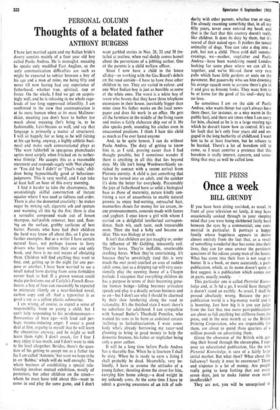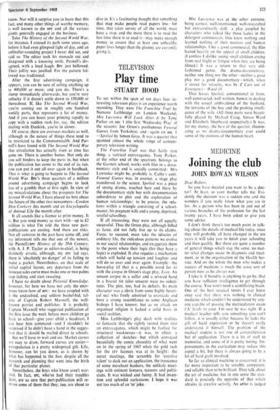Once a week
THE PRESS BILL GRUNDY
If you have been sitting ravished, -as usual, in front of your television set lately, it may have occasionally soaked through to your sleeping mind that you were being clobbered fairly hard between the eyes by a commercial; one com- mercial in particular. It portrays a happy family whose happiness appears to derive almost entirely from the fact that, as a result of something wonderful that has come into their lives; they can for once answer the persistent questions of the odious young man of the house. What has come into their lives is not soap or butter. It is a book, or more accurately, a part- publication, which, as its name doesn't quite at first suggest, is a publication which comes out in parts, usually.weekly. - This particular one is called Pictorial Know- ledge and, at 3s 6d a go, I would have thought it doesn't stand an earthly. As usual, I shall be proved absolutely wrong. Because the part- publication world is a big-money world and it is booming. Just how big it is you can judge from the fact that two more part-publications are about to fall anything but stillborn from the press, and in the next month or so the British Printing Corporation, who are responsible for them, are about to spend three quarters of a million pounds on advertising them.
Given the obsession of the British with get- ting their brood through the eleven-plus, I sup- pose an educational publication, like the new Pictorial Knowledge, is sure of a fairly large initial market. But what then? What about the fall-away? Surely it must be enormous? Three and sixpence is a lot of money. Are people really going to keep forking that out every seven days, just to make Junior even more insufferable?
They are not, you will be unsurprised to
know. Nor will it surprise you to learn that this fact, and many other things of worthy memory, is well known to the BPC and all the various giants generally engaged in the business.
Take The History of the Second World War, for instance. I crossed its path some years ago, before it had even glimpsed light of day, and an unlikelier-sounding project I never did see, and said so. The editor took his monocle out and disagreed with a knowing smile. Purnell's dis- agreed, with a loud laugh. BPC just bellowed. Their jollity was justified' For the pattern fol- lowed was traditional.
After the first advertising campaign, it appears, you can be sure of selling anything up to 400,000 or more; and you do. There's a slump immediately afterwards, but you're very unlucky if it doesn't settle down to 150,000 or thereabout. If, like The Second World War, you're coming out in roughly one hundred weekly parts, that represents a lot of money. And if you can boost your printing rapidly to cope with a sudden rush for, say. the edition dealing with Dunkirk, you're in clover.
Of course, there are overseas markets as well, although in the nature of things these tend to be restricted to the Commonwealth. And Pur- nell's have found with The Second World War that circulation has actually risen as time has gone on. There is another bonus. Not only do you sell binders to keep the parts in, but when the publication has come to the end of its run, you can put it out all over again in hardback. That is what is going to happen to The Second World War. BPC'S three quarters of a million pound advertising campaign begins to look less of a gamble than at first sight. In view of my miscalculations about the prospects for The Second World War, I have placed no bets about the future of the other two newcomers—Cordon Bleu Cookery this month and an Encyclopedia of Animal Life the month after.
It all sounds like a licence to print money. It is. But you need money to start with—up to £2 million is what I'm told the three new part- publications are costing. And there are risks. Not all ventures in the past have come off, and my informant tells me that one of the newest, the Purnell/131)c History of the 20th Century, with A. J. P. Taylor as editor-in-chief, is being distinctly erratic, although, my BPC lad says, there is 'absolutely no danger' of its failing to make a packet. Nevertheless, on that scale of initial capital layout, any departure from the forecast sales curve must make one or two palms stop itching and start sweating.
I have no doubt about Pictorial Knowledge, however, for here we have not only the enor- mous know-how of BPC: we have coupled with it the undoubted, and seldom bushel-hid, tal- eats of Captain Robert Maxwell, the well- known patriot and publisher. It is probably Captain Maxwell who suggested publication of the first issue the week before most children go back to school—give your child a headstart, I can hear him command—and I shouldn't be surprised if he didn't have a hand in the sugges- tion that it should be mailed direct to schools.
But well have to wait and see. Market curves are easy to draw, forward curves are easier— extrapolation is a pretty widespread gift. Life, however, can let you down, as is shown by what has happened to the Sun, despite all the research and planning that went into the birth of that particular planet.
Nevertheless, the boys who know aren't wor- ried. In fact, in, who've had their troubles later, are so sure that part-publication will re- move some of them that they, too, are about to dive in. It's a fascinating thought that something that may make people read papers less—for time, that takes survey of all the world, must have a stop, and the more there is to read the less time there is to read it—may make enough money to ensure that at least one unhealthy paper lives longer than the gloomy are currently giving it.







































 Previous page
Previous page